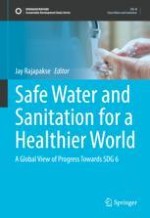2022 | OriginalPaper | Chapter
9. Readiness of Sri Lanka to Achieve SDG 6 Targets in Water and Sanitation by 2030
Authors : B. M. J. K. Balasooriya, Wasantha Illangasinghe, Sumitha Sumanaweera, Jay Rajapakse
Published in: Safe Water and Sanitation for a Healthier World
Publisher: Springer International Publishing
Activate our intelligent search to find suitable subject content or patents.
Select sections of text to find matching patents with Artificial Intelligence. powered by
Select sections of text to find additional relevant content using AI-assisted search. powered by
Abstract
Provision of safe drinking water is one of the Sri Lankan government’s priorities and targets are set periodically with regard to the achievements of safe drinking water access and adequate sanitation. The MDG7 target was met by Sri Lanka and the country found itself in a better position at the end of 2015, in the preparation towards SDG 6 targets. Sri Lanka is committed to work towards the Agenda 2030. The enactment of Sustainable Development Act, establishment of Sustainable Development Council, and the appointment of a Select Committee of Sri Lankan Parliament Board SDG 2030, in 2016 were some milestones towards this commitment. In 2020, the nodal agency for policy implementation, monitoring, and reporting in the drinking water and sanitation sector in Sri Lanka was the Ministry of Water Supply together with National Water Supply and Drainage Board (NWSDB or Water Board) and Department of National Community Water Supply. Revision of policies to reflect the sector policies by these bodies is continuously undertaken to achieve Agenda 2030 goals. The government’s accelerated programs to improve water supply coverage through short term, medium term, and long term projects by increasing capacity of existing treatment plants, laying new distribution pipes, developing new water supply and sewerage projects, and encouraging efficiency improvements are discussed. Sri Lanka has presented its first Voluntary National Review on SDGs to the UN High-Level Political Forum (HLPF) in 2018. The country’s current SDG progress in the water and sanitation is presented with many challenges facing the country, such as the impact of climate change on water quality and quantity, water quality issues due to inadequate treatment, community engagement, and many others exacerbated by the COVID-19 pandemic.
